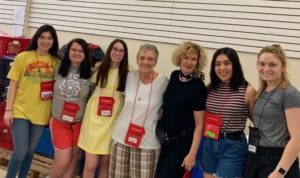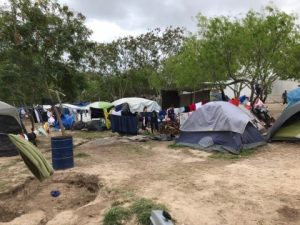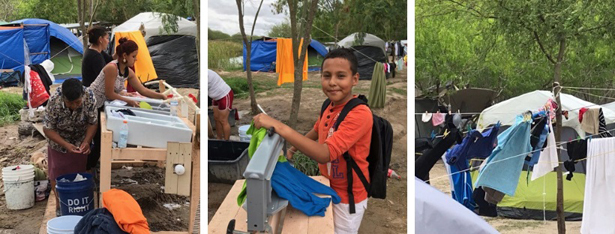Dominican Sister of Peace Leads Student Trip to Border
By Sister Margie Davis, OP
McAllen, TX – Over the week of March 8-14, I had the privilege of being part of the Ohio Dominican University Spring Mission Trip volunteering at the Catholic Charities of the Rio Grande Valley, Humanitarian Respite Center in McAllen, TX. The Center provides a place for the countless men, women, children, and infant refugees to rest, have a warm meal, a shower, and change into clean clothing as well as receive medicine and other supplies before continuing on their journey.
Current government policy mandates that those seeking asylum in the U.S. must stay in Mexico until their court date and hearing. Those families can wait more than a year for their hearing, and even then almost all of the cases are denied. These asylum seekers, many of whom are facing violence or worse, can appeal, but it’s a lengthy process. If asylum is ultimately denied, the asylum seekers are taken to the airport in shackles and deported back to the dangerous situation that they fled in the first place.

With this in mind, I and four Ohio Dominican University students, along with ODU Director of Human Resources Amy Thomas and Jen Gervasi, wife of ODU President Bob Gervasi, traveled to the Tent City in Matamoras, Mexico. There 3000 families, including children, have been forced to live among inhumane conditions for the crime of wanting to escape the violence and poverty of their home country.
During orientation at the Respite Center, we were given our agenda for the week and introduced to the dedicated staff and volunteers that come every day to serve the people. In the afternoon, we organized and packed the food and other basic necessities that we would take across the Border to serve the people in Tent City.
Monday morning we loaded food and packages into the truck that would take us all to the Texas border. After filling up all carts with the packages of supplies, the six of us from ODU and other regular volunteers hauled the heavy loads to the border. And by “haul,” I mean we loaded huge carts and pushed, pulled and heaved them one and one-half miles across the dry ground and brush.

Once we crossed the border, we saw a huge fence in front of endless rows of tents. But what really captured my attention was the sight of the many children scrambling along the fence. They weren’t smiling or excited – they just stared, blank expressions on their faces.
Upon walking into the tent city, I think we all were filled with a variety of emotions ranging from extreme sadness to anger that people are being forced to live in such inhumane conditions, to a desire to “make it better,” to an almost overwhelming sense of hopelessness. In the face of such tragedy, what could we do?
The first thing we did was to set up long tables, organize the food that we had brought, and package individual bags filled with red beans, flour, salt, sugar, oil, water, coffee – one for each family, enough for a week. We also had toiletries, diapers, cleaning products and more. Then the people of this massive tent city formed what seemed like an endless line and kept coming and coming.

You may ask, “In a place like this, how can these refugees cook their own food?” Self-sufficiency is an important part of the Latino culture. They want to take care of themselves and made every effort to do so. Each family had created their own “yard” around their tent, complete with a fire pit for cooking. As I looked around, I saw other ways that people were trying to create that “normal” life…a clothesline with shirts, pants, and dresses hanging to dry, a group of women scrubbing and cleaning clothes at a special table donated by another organization. A little boy was helping out by using an old wringer to wring out the clean clothes before hanging them up.
There are other non-profit organizations that have also found ways to help: donating portable restrooms with a cleaning station, a huge container of clean water, even a tent with activities and music for the children.
A couple of us “broke the law” and walked around without the staff to get a sense of the community around us. We saw people talking together, a young man singing a gospel song, people on cell phones, women doing household chores, and children trying to play and laugh. I was able to help a little girl carry her huge bucket of water, but because of the restrictions to stay with our group, I was not able to carry it all the way to her home.
I don’t think the images from this visit will ever leave my mind. Due to new restrictions around the corona virus, we were the last group that was able to go into the Tent City, and I find myself wondering, who is feeding these people now?
What have we as a nation, and as a people of God, come to, that we can allow this inhuman treatment of our brothers and sisters that Jesus would have called “the least of these?” I find myself going back to my original question, what can we do?
I can hear myself saying, “You have to pray. Things will be okay. You have to have Hope – God is there,” but it is not always easy. I want to be the hands and feet of Christ in this place, and see with my own eyes that these people are being fed.
But since I can’t do that, I will persist, I will speak out, and I will pray that God will show us a different and better way to care for our neighbors, the people of God.
 USA
USA


